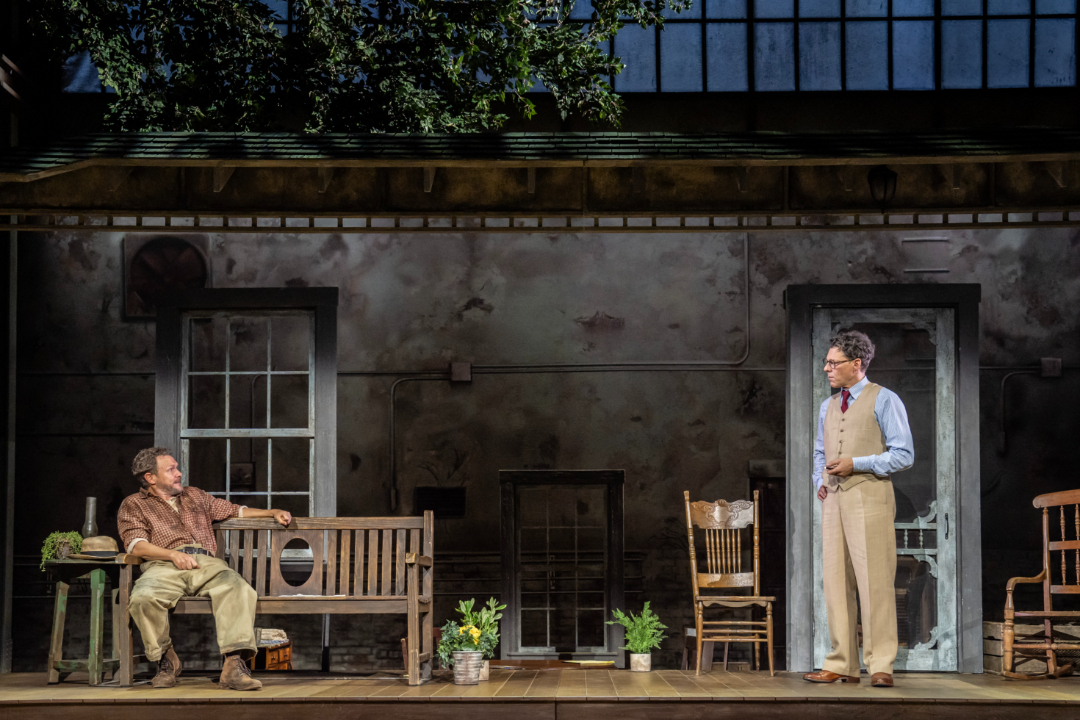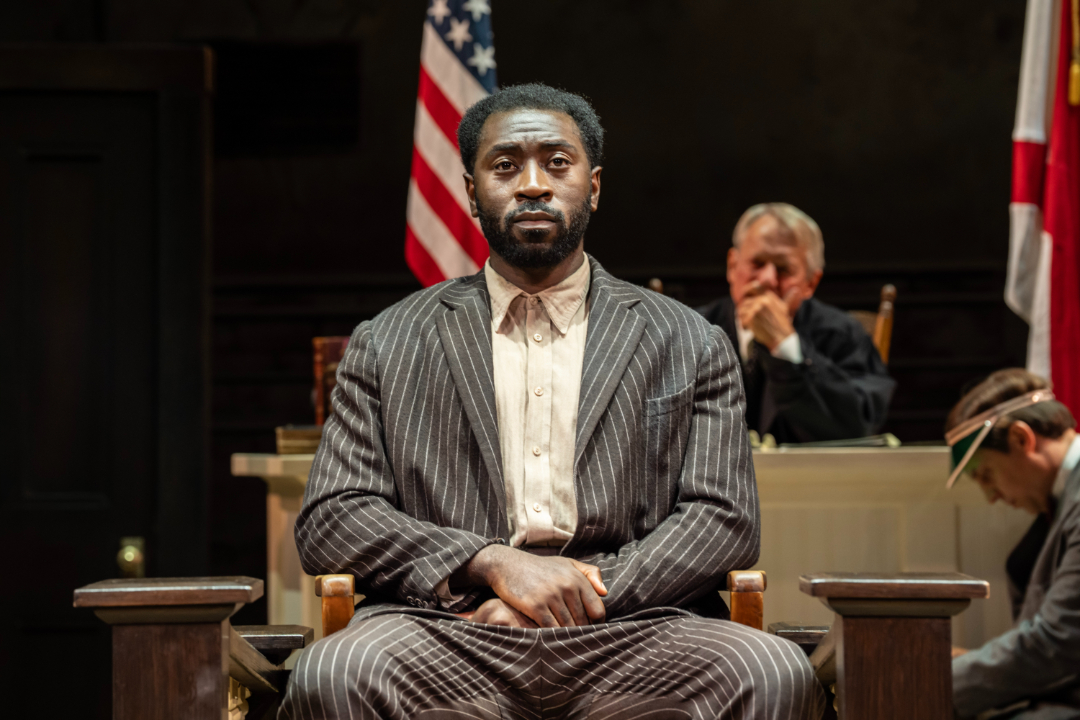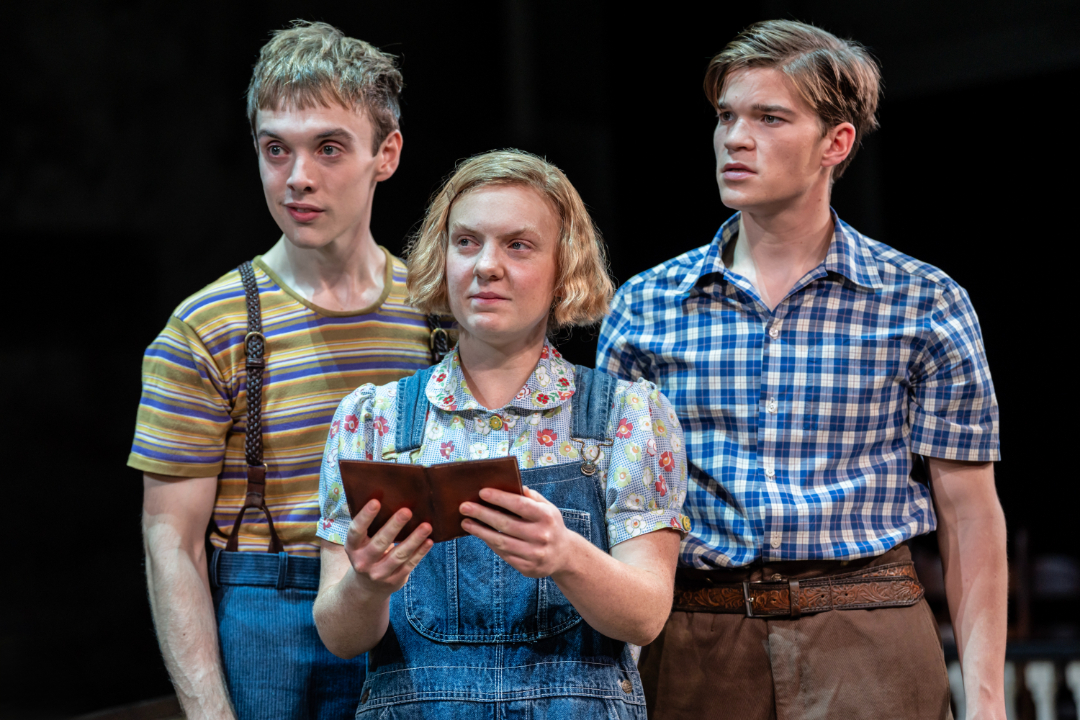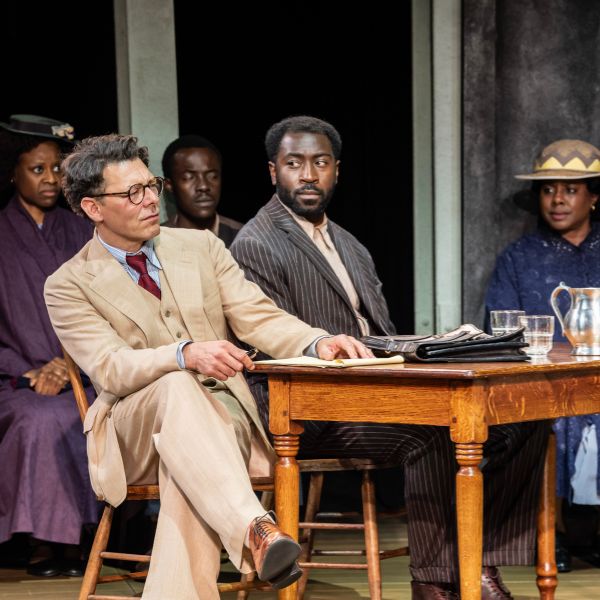⭐⭐⭐⭐⭐
Rating: 4.5 out of 5.
Aaron Sorkin and Bartlett Sher’s erudite take on Harper Lee’s To Kill a Mockingbird distils the beloved novel into a charming, memorable, wryly humane courtroom drama. A Broadway hit born of America’s Trump years, Sorkin’s version arrives in Edinburgh; a courtroom history for our age — haunted not by the past, but by unfinished business.
Memory and justice in Maycomb
Frequently brought to stage, Harper Lee’s seminal 1960 novel consistently tops polls of favourite books both here and in its native USA. Yet, though Sorkin shares Lee’s love of language, he isn’t interested in a literal run-through of the original story.
The time is still 1934, the place still the fictional town of Maycomb, Alabama. Yet when the curtain rises on our narrator, Scout Finch (Anna Munden), she’s a young woman rather than a six-year-old, and she’s not alone. Not content with one chorus, Sorkin offers a three-part choir completed by older brother Jem (Gabriel Scott) and childhood bestie Dill (Dylan Malyn).
Munden’s easy warmth and down-home rasp make her engaging company, while Malyn’s sweetly damaged Dill offers both comic relief and a smaller tragedy in the shadow of the play’s greater sins. Memory here isn’t nostalgia, but interrogation — an effort to understand how the moral world of their childhood collapsed into violence.
“Yet, though Sorkin shares Lee’s love of language, he isn’t interested in a literal run-through of the original story.”
The lightest of dramatic framings finds these grown-ups looking back on their childhoods, trying to puzzle out what happened one night, many years ago, when Bob Ewell – a drunk, racist, child-abusing enemy of their father’s – tried to kill them, only to fall… on his own knife.
A trial by memory: Atticus and the courtroom
Their recollections summon their father Atticus back to the courtroom to defend Tom Robinson (a magnificently human Aaron Shosanya) from a spurious rape accusation. There’s no proof the crime even took place, but Tom is Black, his accuser white, and in 1930s Alabama, that’s quite enough.
It’s no surprise that Sorkin, known for whip-smart dialogue, knows how to write compelling courtroom drama. Sher proves an able accomplice, letting the volatile mix of hope, fear, hate, fact and shameful fiction swell toward an inevitable breaking point with escalating pace. The formative adventures of Scout and her family outside these proceedings are handled with affection but not – thankfully – excessive romanticism.
Atticus remains an admirable human being, swimming against a tide of ignorance to save the life of an innocent man, but he is far from blemish-free. Stepping into Richard Coyle’s shoes for the Edinburgh press night, John J. O’Hagan cut a fine, linen-suited figure. Quietly authentic rather than charismatic, O’Hagan’s lawyer proved easy to like, however much – or perhaps of just how much – the playwrite wants us to see his failings.
Sorkin’s moral recalibration
For, in Sorkin’s telling, Atticus’s insistence on treating everyone with respect, however hateful, becomes a refusal to rock the boat – however badly it needs to sink out of sight. Sorkin gives the Finches’ beloved housekeeper Calpurnia (Andrea Davy) sharper teeth, allowing her to upbraid Atticus not only for his politeness to racists but for the muttered “You’re welcome” he offers when she isn’t suitably impressed by his defence of a Black man.
These latter events are all Sorkin, of course – he respects Lee’s creations, but there isn’t a single sacred cow on stage. Does he gild the lily a little by adding virulent antisemitism and explicit white-supremacist rhetoric to Bob Ewell’s vocabulary? Possibly. Can we draw a direct line from these to the febrile sensibilities of Sorkin’s native land? Without doubt. Does the result verge on pantomime villainy? Maybe.
One thing’s certain: where Lee saw a South shaded in tones of grey, Sorkin sees mostly black and white. The audience is left in no doubt that they’re following a small, noble band of heroes facing off against a faceless mob, drunk on broken dreams of the pre-revolutionary South.

Oscar Pearce (Bob Ewell) Richard Coyle (Atticus Finch) in To Kill A Mockingbird. Photo by Johan Persson

Aaron Shosanya (Tom Robinson) in To Kill A Mockingbird. Photo by Johan Persson

Dylan Malyn (Dill Harris) Anna Munden (Scout Finch) Gabrield Scott (Jem Finch) in To Kill A Mockingbird. Photo by Johan Persson
A play of its political moment
Sorkin’s adaptation first hit the US stage in 2018, a year after Trump came to the White House – and it shows. Yet if there’s a river of cynicism flowing through the show, Sorkin relents with a clutch of beautiful moments aimed directly at the heartstrings. When Atticus peeks behind Dill’s oddly mature brand of compassion, or when Scout calls “All Rise” – not for the judge but for her father – it’s spine-tinglingly well-judged.
A finely judged ensemble
The supporting cast is uniformly excellent, from Stephen Boxer’s irascibly decent Judge Taylor to Evie Hargreaves’s toxically indoctrinated and horribly abused Mayella Ewell. There’s a lived-in feel to even the briefest of appearances, and a strong sense of community, even if we meet relatively few townsfolk.
“One thing’s certain: where Lee saw a South shaded in tones of grey, Sorkin sees mostly black and white.”
Design that serves the story
Helping to manifest these fictional spectres of the past, Miriam Buether’s set proves a highly modular affair, parts sliding on and off stage with practised ease, whether courtroom, front porch or jailhouse is required. As with Sher’s focused, unfussy direction, the design eschews soft edges or needless prettiness. Adam Guettel’s gentle, southern-edged score provides the most cinematic element of the production, despite its understatement.
The story’s the thing here – everything else either serves in its telling, or didn’t make the final cut.
Verdict: Maycomb’s ghosts still speak
Ultimately, Sorkin and Sher’s To Kill a Mockingbird is a first-rate production, and a bold attempt to bring something new to the conversation it began more than half a century ago.
Featured Image: Richard Coyle (Atticus Finch) Aaron Shosanya (Tom Robinson) with the To Kill A Mockingbird cast. Photo by Johan Persson
Details
Show: To Kill a Mockingbird
Venue: Festival Theatre, Edinburgh
Dates: 21 – 25 October 2025
Running Time: 2 hours 50 minutes (incl. 20 min interval)
Age Guidance: 12+
Admission: From approx. £18 (subject to booking)
Time: Evenings at 7:30pm; Thu & Sat matinees at 2:30pm
Accessibility: Wheelchair Accessible Venue; Audio described, BSL, captioned & touch-tour available (Sat 25 Oct); show contains brief gunfire audio and racially explicit language
To Kill a Mockingbird runs at the Edinburgh Festival Theatre. For tickets or more information, click here.
